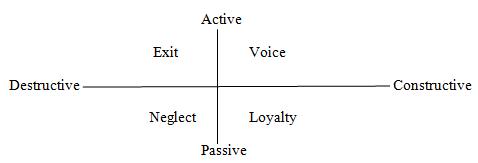Conflict occurs at various levels within the individuals, between the individuals in a group and between the groups in an organisation. An issue between two or more parties who have (or think they have) incompatible goals or ideas. Conflicts may involve deep-rooted moral or value differences, high stakes distributional questions, or can be about who dominates whom. Conflict is a perpetual given of life, although varying views of it may be held. Some may view conflict as being a negative situation which must be avoided at any cost. Others may see conflict as being a phenomenon which necessitates management. Still others may consider conflict as being an exciting opportunity for personal growth and so try to use it to his Continue reading
Human Resource Concepts
Role Efficacy: Meaning, Aspects and Measurement
What is Role Efficacy? The performance of a person working in an organization depends on his own potential effectiveness, technical competence, managerial experience as well as the design of the role that he performs in the organization. It is the integration of the two that ensures a person’s effectiveness in the organization. Unless a person has the requisite knowledge, technical competence and the skills required for the role, he cannot be effective. If the role does not allow the person to use his competence, and if he constantly feels frustrated in the role, his effectiveness is likely to be low. The integration of a person and the role comes about when the role is able to fulfill the needs Continue reading
Determinants of Job Satisfaction
Job satisfaction is a psychological aspect. It is an expression of feeling about the job. Job satisfaction is an attitude. It is a permanent impression formed about the job. Employees interact with people and other resources while working with the job. In the process, they experience positive or negative feelings about the job context and content. The concept of job satisfaction has gained importance ever since the human relations approach has become popular. Most Important Determinants of Job Satisfaction Job satisfaction is intangible and it is multi-variable. A number of factors influence job satisfaction of employees. They can be classified into two categories. They are organizational and personal variables. They are discussed below: Organizational Determinants: Employees spend most of the Continue reading
Employee Responses to Job Dissatisfaction
Employee can express job dissatisfaction in a number of ways. For example, rather than quit, employees can complain, be insubordinate, steal organizational property, or shirk a part of their work responsibilities. Following figure offers four responses to job dissatisfaction that differ from one another along two dimensions: constructive/destructive and active/passive. They are defined as follows: Exit: Behavior directed toward leaving the organization, including looking for a new position as well as resigning. Voice: Actively and constructively attempting to improve conditions, including suggesting improvements, discussing problems with superiors, and some forms of union activity. Loyalty: Passively but optimistically waiting for conditions to improve, including speaking up for the organization in the face of external criticism and trusting the organization and its Continue reading
Theories of Collective Bargaining
Collective bargaining is process of joint decision making and basically represents a democratic way of life in industry. It is the process of negotiation between firm’s and workers’ representatives for the purpose of establishing mutually agreeable conditions of employment. Collective bargaining is a technique adopted by two parties to reach an understanding acceptable to both through the process of discussion and negotiation. Collective bargaining involves discussions and negotiations between two groups as to the terms and conditions of employment. It is called ‘collective’ because both the employer and the employee act as a group rather than as individuals. It is known as ‘bargaining’ because the method of reaching an agreement involves proposals and counter proposals, offers and counter offers and Continue reading
Job Analysis – Meaning, Roles, Purposes and Types
Human resources management has to plan their activity to reach maximum level of organizational objective. Human resources personnel must have knowledge regarding skills required to perform various organizational jobs. Job analysis is done to get information regarding the requirement of skill, knowledge, experience, ability and other work related requirement. A job analysis is a systematic exploration of the activities within a job. Basically it is a technical process, which is used to define the duties, responsibilities, and accountabilities of a particular job. This analysis involves describing detail description about the task one has to perform during work, exploring the relationship with job to technology and determining knowledge, qualifications or the standards of employment, accountability of the person. There is an Continue reading

